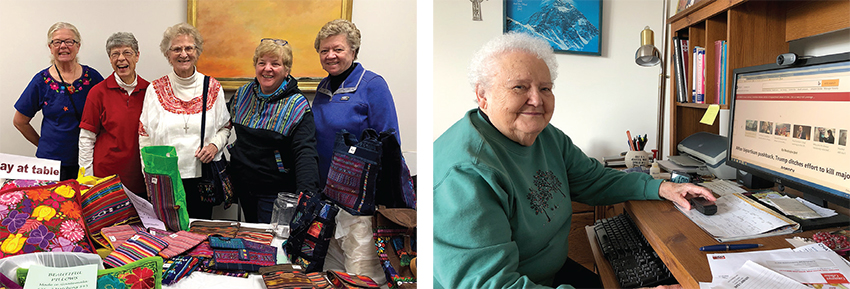 Left, Sisters Marifé Hellman, Judy Niday, Marita Beumer, Patty Kremer and Joyce Langhals at the December Catholic Social Action Fair Trade Sale at the University of Dayton; right, Sister Helen Weber corresponds weekly with her elected representative.
Left, Sisters Marifé Hellman, Judy Niday, Marita Beumer, Patty Kremer and Joyce Langhals at the December Catholic Social Action Fair Trade Sale at the University of Dayton; right, Sister Helen Weber corresponds weekly with her elected representative.
Seeing my beautiful doll lying in the box on a soft bed of tissue paper, my young self took one last look at her before I somewhat reluctantly closed the lid and sealed her image in my memory. My parents had encouraged me and my siblings to take stock of our toys and to consider parting with some of them in order to give Christmas presents to underprivileged children. Not able to fully comprehend it at the time, I also received a gift in doing this — a lesson in solidarity.
Our world offers us many opportunities to grow in solidarity with others and to restore dignity to the excluded, the exploited and the impoverished. During the Christmas season and in anticipation of a new year, it seems an appropriate time to reflect on how we might better align our lives with our brothers and sisters in Christ in order to achieve a more just society and greater peace on earth.
We are reminded in Matthew 10:8, “Without cost you have received; without cost you are to give.” How can we die to self, diminish our individualism and sense of unlimited freedom so that we can better understand our interdependence and commit to the common good — to the benefit and the interests of all people?
Jesus shows us the way. He became incarnate to be light for all people. Jesus sought out those who people of his culture didn’t normally associate with — tax collectors, prostitutes, the afflicted, gentiles, etc. He modeled acceptance, right relationship and solidarity for others to witness. He spoke up against the establishment and challenged unjust laws. He directed us to love one another as we do ourselves — teaching us that we have a responsibility for one another; God entrusts us to care for each other.
Our Sisters of the Precious Blood, even in their retirement, continue to work for the common good in their ministries, in their practices, in their prayer and in their advocacy. In many of these same ways and in other daily actions, the laity can make inroads toward greater human and ecological solidarity, too.
For example, we can examine and make changes to our purchasing habits. We should recognize that procuring goods is always a moral act, not solely an economic act. Thus, it carries a social responsibility. The goods of creation — the natural resources used to make a product — are meant for all. The manufacturing processes, the dignity and security of the laborers and the transportation of the goods should be considered. This is where sacrifice and letting go of our personal preferences and desires for more sustainable or socially responsible products, for example, help to meet the essential needs of others.
Another action we can take toward greater solidarity is advocacy — legislative or otherwise. We can speak out against injustice and speak up for others who don’t have the same privilege or resources that we do. We can convey our desires to elected officials through a simple email, phone call or petition. We can engage in dialogue with those who differ with us in order to find consensus and a path forward, even if not perfect. With purpose, determination and love we should “reach across the aisle,” not cease communication with those who don’t agree with us.
For our common home, the earth, that we share with humanity — past, present and future — we can make changes to our energy usage, transportation, land use, waste production, plastics use, etc. Again, sacrifice of convenience and personal preferences (that are often justified due to “busyness”) is necessary. Sustainable practices must be incorporated into our lifestyles, for we cannot achieve lasting peace with the existence of great ecological, economic and social imbalances that exist in our society today.
Our prayer is so necessary in order to sustain our efforts, to know our path forward and to petition our Lord for those in need — itself an act of solidarity.
With faith and trust in God, our efforts to achieve greater solidarity will gift us with fresh eyes, new understanding and the joy of unity.
— Story and photos by Colleen Kammer





